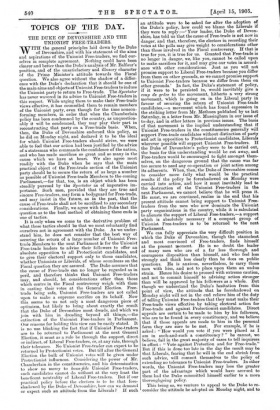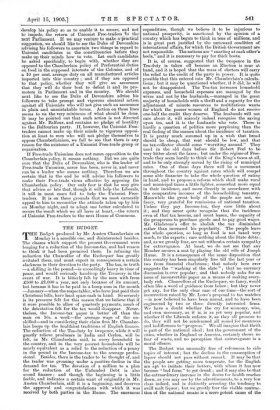TOPICS OF THE DAY.
THE DUKE OF DEVONSHIRE AND THE UNIONIST FREE-TRADERS.
WITH the general principles laid down by the Duke of Devonshire, and with his statement of the aims and aspirations of the Unionist Free-traders, we find our- selves in complete agreement. Nothing could have been clearer and better than the Duke's analysis of Mr. Balfour's position, and of the unsatisfactory and illusory character of the Prime Minister's attitude towards the Fiscal question. We also agree without the shadow of a differ- ence with the Duke's declaration that it should be one of the main aims and objects of Unionist Free-traders to induce the Unionist party to return to Free-trade. The Spectator has never wavered in its advice to Unionist Free-traders in this respect. While urging them to make their Free-trade views effective, it has counselled them to remain members of the Unionist party, even though for the time noncon- forming members, in order that when the Chamberlain policy has been condemned by the country, as unquestion- ably it will be condemned, they may play their part in reconstructing that party on a Free-trade basis. When, then, the Duke of Devonshire endorsed this policy, as he did on Monday night, and declared it to be the ideal for which Unionist Free-traders should strive, we were able to feel that our action had been justified by the advice of a statesman who commands the confidence of the nation, and who has made sacrifices so great and so many in the cause which we have at heart. We also agree most readily with the Duke when he says that the main practical object of the Free-trade section of the Unionist party should be to secure the return of as large a number as possible of Unionist Free-trade Members to the coming Parliament,—for that, too, is an object which has been steadily pursued by the Spectator as of imperative im- portance. Such men, provided that they are true and sincere Free-traders, may form a bodyguard for Free-trade, and may insist in the future, as in the past, that the cause of Free-trade shall not be sacrificed to any secondary considerations. Finally, we agree with the Duke that the question as to the best method of obtaining these ends is one of tactics.
It is only when we come to the derivative problem of what these tactics should be that we most reluctantly find ourselves not in agreement with the Duke. As we under- stand him, he does not consider that the best way of securing the return of a large number of Unionist Free- trade Members to the next Parliament its for the Unionist Free-trade leaders to advise their followers to offer an absolute opposition to all Protectionist candidates, and to give their electoral support only to those candidates, whether Unionists or Liberals, of whose soundness on the Fiscal question they are assured. The Duke assumes that the cause of Free-trade can no longer be regarded as in peril, and therefore thinks that Unionist Free-traders may, and should, let considerations other than those which centre in the Fiscal controversy weigh with them in casting their votes at the General Election. Free- trade being safe, Unionist Free-traders are not called upon to make a supreme sacrifice on its behalf. Now this seems to us not only a most dangerous piece of optimism, but likely to bring about exactly the result that the Duke of Devonshire most dreads, and which we join with him in dreading beyond all things,—the extinction of the Unionist Free-traders in Parliament. Our reasons for holding this view can be easily stated. It is no use blinking the fact that if Unionist Free-traders are to be returned to Parliament at the next General Election, it must as a rule be through the support, direct or indirect, of Liberal Free-traders, or, at any rate, through their tolerance. No Unionist Free-trader can expect to be returned by Protectionist votes. But till after the General Election the bulk of Unionist votes will be given under Protectionist influences. Considering the power of Mr. Chamberlain in the constituencies, and his determination to show no mercy to bona-fide Unionist Free-traders, such candidates cannot do without at the very least the beneficent neutrality of Liberal Free-traders. But if our practical policy before the electors is to be that fore- shadowed by the Duke of Devonshire, how can we demand or expect such an attitude from the Liberals ? If such an attitude were to be asked for after the adoption of the Duke's policy, how could we blame the Liberals if they were to reply Your leader, the Duke of Devon- shire, has told us that the cause of Free-trade is not now in danger, and that, therefore, the electors in recording their votes at the polls may give weight to considerations other than those involved in the Fiscal controversy. If that is true for you, it is true for us. Granted that Free-trade is no longer in danger, we, like you, cannot be called upon to make sacrifices for it, and may give our votes in accord- ance with other considerations. Just as you will not promise support to Liberal Free-traders because you differ from them on other grounds, so we cannot promise support to Unionist Free-traders because we differ from them on other grounds.' In fact, the Duke's statement of policy, if it were to be persisted in, would inevitably give a coup de grdce to the movement, hitherto a very strong movement, which is going on in the Liberal party in favour of securing the return of Unionist Free-trade candidates,—a movement which has found expression in the striking letter from Mr. Methuen published by us last Saturday, in a letter from Mr. Massingham in our issue of to-day, and in other letters in previous issues. The basis of that movement is the implied understanding that if Unionist Free-traders in the constituencies generally will support Free-trade candidates without distinction of party and act in opposition to Protectionist candidates, Liberals wherever possible will support Unionist Free-traders. If the Duke of Devonshire's policy were to be carried out, the basis for this understanding would be cut away, and Free-traders would be encouraged to fight amongst them- selves, on the dangerous ground that the cause was far too secure to need any co-operation or joint action among its adherents. When, then, the Duke of Devonshire comes to consider more fully what would be the practical results if the policy be foreshadowed on Monday were carried into action, and how it must inevitably lead to the destruction of the Unionist Free-traders in the next Parliament, we cannot believe that he will press it. He must, we are convinced, realise in the end that his present attitude cannot bring support to Unionist Free- traders from the men who now dominate the Unionist party organisations in the country, while it is calculated to alienate the support of Liberal Free-traders,--a support which is absolutely necessary if a compact group of Unionist Free-traders is to be returned to the next Parliament.
We can fully appreciate the very difficult position in which the Duke of Devonshire, though the staunchest and most convinced of Free-traders, finds himself at the present moment. He is no doubt the leader of many men who are of a far less thorough and courageous disposition than himself, and who feel less strongly and think less clearly than he does on public questions. He is anxious, nevertheless, to carry those men with him, and not to place upon them an undue strain. Hence his desire to proceed with extreme caution, and not to commit himself to advising action stronger than will be approved by his followers as a whole. But though we understand the Duke's hesitation from this point of view, the attitude that he foreshadowed on Monday night will not in the end relieve him of the duty of telling Unionist Free-traders that they must make their Free-trade views effective by taking electoral action for Free-trade and against Protectionist candidates. Direct appeals are certain to be made to him by his followers, who are to be found in every constituency, and we believe that if those appeals are made to him in the personal form they are sure to be met. For example, if he is asked : " How would you vote if you were placed as I am in such-and-such a constituency ? " he cannot, we believe, fail in the great majority of cases to tell inquirers in effect : " Vote against Protection and for Free-trade." But if this is done too late in the day the result may be that Liberals, fearing that he will in the end shrink from such advice, will commit themselves to the policy of extending no tolerance to Unionist Free-traders. In other words, the Unionist Free-traders may lose the greater part of the advantage which would have accrued to them had the Duke committed himself earlier to a more thoroughgoing policy.
This being so, we venture to appeal to the Duke to re- consider the attitude he adopted on Monday night, and to develep his policy so as to 'enable it to secure, and not to impede, the return of Unionist Free-triderS 10 the,. next Parliament. If we may venture to make aliractical suggestion, we should like to see the Duke of Devonshire advising his followers to ascertain • two things in regard to Unionist candidates in the constituencies before they make up their minds how to vote. Let such candidates be asked specifically, to begin with, whether they are opposed to the Chamberlain policy of Preferential duties OIL food in the supposed interests of the Colonies, and of a 10 per cent. average duty on all manufactured articles imported into this country ; and if they are opposed to that policy, whether they will give an assurance that they will do their best to defeat it and its pro- moters in • Parliament and in the country. We should next like to see the Duke of Devonshire advise his followers to take prompt and vigorous electoral action against all Unionists who will not give such an assurance in plain and unmistakable terms. Action on these lines seems to us the very minimum of what should be done. It may be pointed out that such action is not directed against Mr. Balfour, and contains no pledge of hostility to the Balfourian party. If, however, the Unionist Free- traders cannot make up their minds to vigorous opposi- tibn at least to men who will not pledge themselves to oppose Chamberlainism, we fail to see that there is any reason for the existence of a Unionist Free-trade group or organisation.
If Free-trade Unionism does not mean opposition to the Chamberlain policy, it means nothing. But we are quite sure that the Duke of Devonshire, who is the leader of Free-trade Unionism, never has been, never is, and never can be a leader who means nothing. Therefore we are certain that in the end he will advise his followers to make their Free-trade views effective by opposing the Chamberlain policy. Our only fear is that he may give that advice so late that, though it will help the Liberals, it will in most cases fail to help the Unionist Free- traders. It is on these grounds that we most earnestly appeal to him to reconsider the attitude taken up by him on Monday night, and to adopt one better calculated to secure the result which we all have at heart,—the return of Unionist Free-traders to the next House of Commons.











































 Previous page
Previous page